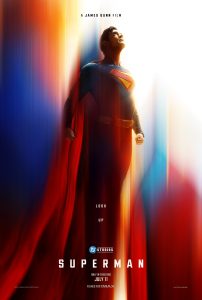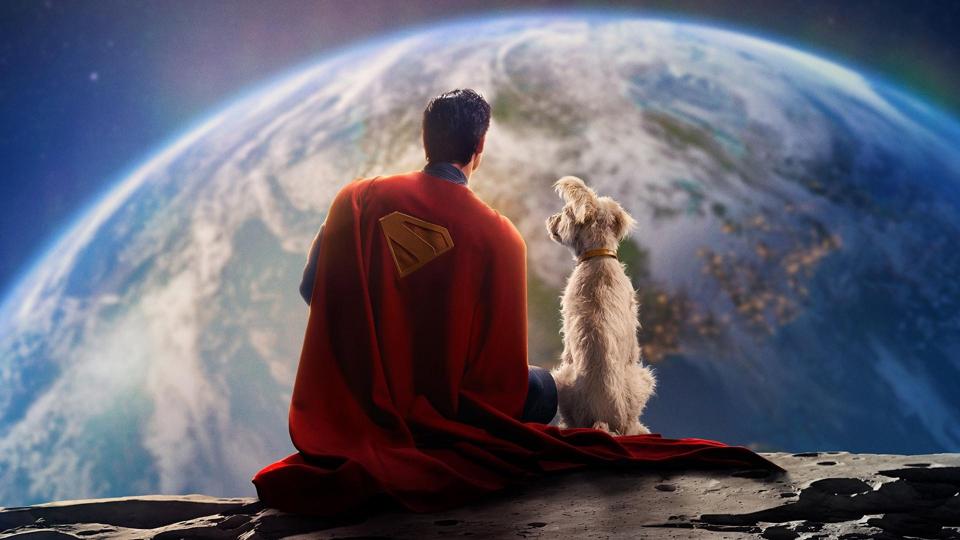If Superman has historically been problematic for writers over the near century of his existence, it has always been how to conjure a story about him where he was actually challenged. Being the strongest/smartest/fastest creature on the planet who is also invulnerable to damage, and required no sleep or food, while being immune to disease tends to put a crimp on just how many ways he can be rendered assailable.
For writer/director James Gunn, however, in the first entry of the brand new DC-based comic universe of which he is co-CEO (along with Peter Safran), he has come up with an equitable solution: Beat Superman’s ass all over the screen.
When we first see him, in fact, he’s shot as if from a canon into the snowy reaches of Antarctica. Bloody, bruised, and barely able to speak beyond calling for Krypto, the delightfully playful superdog, Supes is more or less helpless as he’s dragged by his cape back to his Fortress of Solitude, where he gets healed and re-energized with the help of some robots and a blast of yellow sun energy.
Throughout the film, in fact, Superman (David Corenswet) gets beaten and bloodied all over the place, both physically — and after supervillain Lex Luthor (Nicolas Hault, absolutely eating the screen alive) has his (literal) scribing monkeys killing him on social media — and emotionally, becoming estranged from the planet he thought he was sent to in order to protect.
Luthor, it seems, has an evil-genius plan to fund one (fictional) Eastern European country, Boravia, helmed by a wild-haired fascist named Ghurkos (Zlatko Buric) in order for them to invade Jarhanpur, a seemingly poorer (fictional) country at their border, in order to eventually be able to take it over and turn it into his own sovereign empire for the supervillain.
The thing standing in the way of said plan, is of course the becaped wonder-kid, who, as the film opens, has recently staved off just such an attack from Boravia on his own accord, to the consternation of some in the U.S. government, who didn’t sanction such action. In Gunn’s film, Superman lives in the U.S. but isn’t of the place, acting as a solo agent when he thinks it’s necessary.
Ergo, part of Luthor’s plan — a huge part, it turns out — is to attack Supes from multiple angles at once. First, he sics a genetically enhanced duo, including “The Engineer” (María Gabriela de Faría), a woman who has millions of metallic nanites under her control; and “Ultra-Man” (identity withheld), who seems fully capable of battling Supes to a stand-still himself (especially with Luthor, watching the action from the relative safety of his command center high above Metropolis, barking out fight commands to his lethal enforcer exactly as if playing a video game).
After battering him with that pair, Luthor next goes after the Fortress of Solitude, gaining entry, destroying the many robots who inhabit the place, and deciphering what was meant to be a message of encouragement from Superman’s dead parents (Bradley Cooper and Angela Sarafyan), that instead was a call to action by his folks to take over Earth and dominate it.

When word of that leaks by Luthor to all the global major news outlets at once, the citizens turn on their former hero, leaving Superman increasingly isolated in his war against Luthor’s colossal scheme. That is, until he hooks up with the “Gang of Justice,” a neophyte gathering of super-powered types that has the planet protector Green Lantern (Nathan Fillion), the screeching Hawkgirl (Isabella Merced) and the genius inventor Mr. Terrific (Edi Gathegi). Together, they set up a showdown with Luthor, in which Superman will be pushed to the limits.
The film is rife with Gunnisms, those small touches that humanize his otherwise mega-powered characters — Krypto, being both a good boy, and a wildly untrained young pup, wants to play far more than help Superman, as he displays when he’s first called to his stricken caretaker and instead of immediately helping him, jumps up and down on Superman’s already badly damaged rib cage; it is revealed that one of young Clark Kent’s favorite bands growing up was the (fictional) decidedly mid pop-punk band The Mighty Crabjoys, a choice whom his romantic foil, Lois Lane (Rachel Brosnahan), scoffs at; the Green Lantern sports a horrific blonde bowl cut that makes him look like Raiders owner Mark Davis — which do wonders to take the piss out of the heaviness of the characters, in direct refutation of previous DC Studios’ oracle Zack Snyder, whose dark, fatally somber overtones failed to capture an audience outside of immediate diehard fanboys.
Gunn also seems to challenge other now tired elements of the superhero genre: The closing credits do involve two stingers (a trick DC attempted to cop from Marvel, only to much poorer effect, for years), but they are both goofs, not the least bit interested in tagging future projects with fanboy titterations.
Which brings us to one of the issues of this first installment: It seems as if Gunn, in his joyful backhand to expected conventions, has perhaps gone a bit too far in mocking these other super-powered folk. Green Lantern, whose previous solo film was so rejected it sent young star Ryan Reynolds into an abyss before he sparked his career back with Deadpool, is played almost entirely for laughs, a self-important clown who everyone likes to dunk on. With the exception of a special cameo by another super-powered being who makes an appearance near the end, but seems drunken, disorderly, and calls Superman a “bitch” on her way out the door (a character take I would be interested to see), there’s very little hinted at in this film that leads one to want to take the newly re-hatched DCU to their bosom.
For the most part, however, Gunn has seemingly gotten Superman pretty much right. Corenswet is a real find, able to convey both Superman’s idealistic innocence and his feisty fury in equal measure (not unlike Chris Evans’ unforgettable Captain America). It’s a Superman willing to take a joke, and look at his life askew, without being overly concerned with appearances.
It should also come as no surprise that Hoult is able to bring such conviction to Luthor, an intellectual giant who assumes he is so far ahead of the game that the outcome has already been determined. Between Luthor’s (complex) scheming, and Superman’s guileless determination, the film’s dramatic poles are set with flags flying briskly in the wind.
As with his previous superhero entry, Marvel’s Guardians of the Galaxy 3, Gunn is also not afraid to inlay a political subtext into his churning plotlines. Here, we have an “illegal alien” (an “immigrant” as Gunn has referred to him in interviews), falling afoul of an incredibly powerful, self-serving narcissist, who tries to use human’s natural inclination of resentment towards otherness against him in an attempt to discredit him and have him banished from the world he has come to call home. The end result has Luthor’s brutal cynicism, expecting the worst of everyone, pitted against Supes’ hope and faith in the human spirit.
It’s certainly not a version that everyone will embrace — Snyder’s dour fanbase will no doubt kvetch about the lightness of its tone — but Gunn has successfully taken the first step in his DC reboot. I’m not exactly sure what he’s left in the cupboard for the next phase of installments, but that, it would seem, will be a problem for the other filmmakers in the studio’s employ.



1 Comment
Captured how I felt about the film pretty spot on! Awesome review!